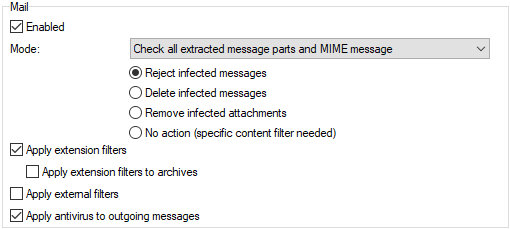Action
Upon the Action tab you specify the actions to be taken when a message is found to contain a virus.

Figure. Mail section.
| Field |
Description |
|---|---|
|
Enabled |
Check the box if you want to have this feature enabled. |
|
Mode |
Choose one of these options: Check all extracted message attachments Only message attachments are scanned. Check all extracted message parts and MIME message The complete messages, including attachments, are scanned. Check MIME Message Only the message is scanned (not attachments). |
|
Reject infected messages |
Infected messages will be immediately rejected by the server. |
|
Delete infected messages |
Infected messages will be accepted and deleted by the server. This option is useful if you want to further process the message even though it contains a virus. For example, you could use content filters to forward the message to an AntiVirus team. |
|
Remove infected attachments |
Any attachments containing a virus will be removed from the message. If an infected attachment cannot be removed, the message is rejected. Note: This option will not function properly if the Check all extracted message parts and MIME message option is selected. |
|
No action (specific content filter needed) |
The message is flagged as spam, but no other action is performed. Warning: Use this option only if you have a content filter set properly! The appropriate condition is Where Scanned by Antivirus. This option is suitable e.g. for viruses analyses. |
|
Apply extension filters |
Check the box if you want to use the extension filters defined upon the Extension Filters tab. |
|
Apply extension filters to archives |
Check the box if you want to use the extension filters defined upon the Extension Filters tab also to archive folders. |
|
Apply external filters |
Check the box if you want to use the external filters defined upon the External Filters tab. |
|
Apply antivirus to outgoing messages |
Check the box if you want to have also outgoing messages checked by antivirus. |

Figure. FTP section.

Figure. SOCKS / Proxy section.

Figure. GroupWare section.

